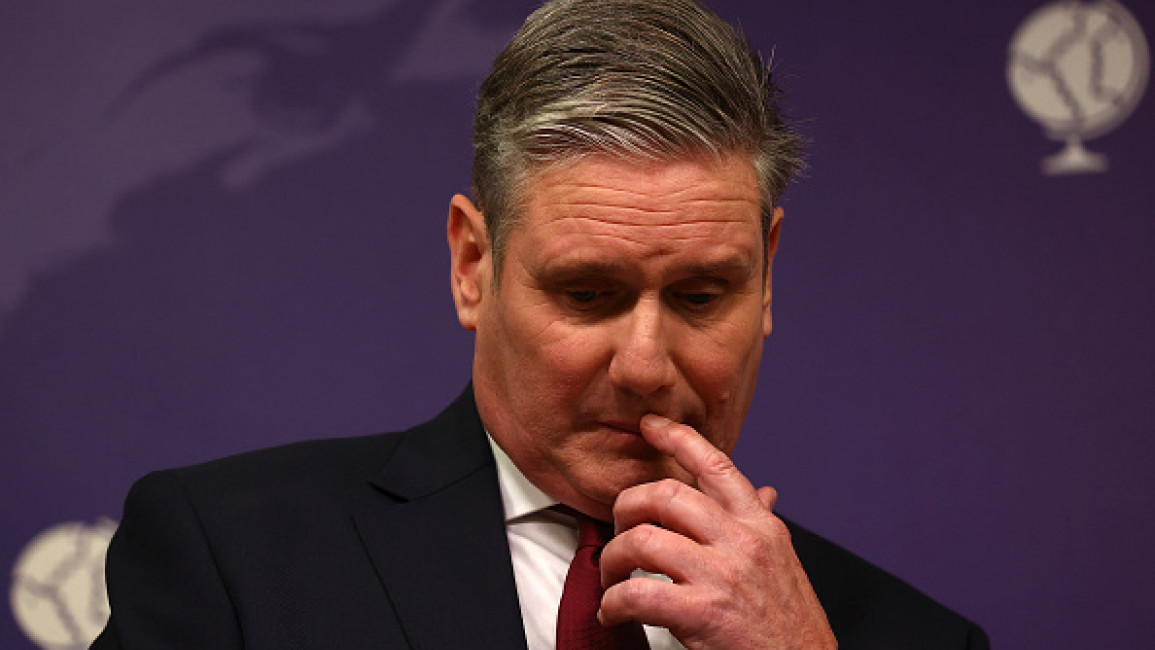Labour would not recognise Palestine, Starmer says, in shift from Corbyn-era policy
UK Labour leader Keir Starmer will rip up a Jeremy Corbyn-era policy on unilaterally recognising the State of Palestine, sparking anger within the party amid Israel's ongoing onslaught on Gaza.
Starmer, who took over the party after Corbyn resigned in 2020, told the Jewish Community Centre London (JW3), that Labour would work toward a two-state solution in conjunction with other states.
This effectively means walking back on a policy established under Corbyn when both the 2017 and 2019 election manifestos pledged to immediately recognise Palestine if Labour won power.
"Recognition has to be part of a process, and an appropriate part of the process," he told JW3.
Starmer confirmed there was "no risk" Labour would recognise Palestine from "day one" of coming to power, a highly likely prospect given that the party has a 20-point lead over the governing Conservative Party with an election on the horizon.
Signs of a change in the party's stance on Palestine were seen in an op-ed written by Shadow Foreign Minister David Lammy in November, when he said Labour "will strive to recognise Palestine as a sovereign state, as part of efforts to contribute to securing a negotiated two-state solution".
This was interpreted as a weakening of Labour's commitment to unilaterally recognising the State of Palestine, which Lammy also rejected as an "unrealistic gesture".
In October, Labour's Executive Committee also passed a recommendation that Labour should "work alongside international partners to recognise the state of Palestine alongside the state of Israel, as part of efforts to contribute to securing a negotiated two-state solution" - another indication that the party would drop its pledge on State of Palestine recognition.
Shadow Middle East Minister Wayne David welcomed Starmer's comments about said it marked a departure from the "t-shirt" politics of the Corbyn-era.
"We will recognise the state of Palestine at a point which will help the peace process once negotiations between Israel and Palestine and the others are taking place," he said, according to the Jewish Chronicle.
"It’s not about the Labour government going, 'right we recognise Palestine’, big deal!"
The new policy would also appear to be a rebuff of a symbolic move by the UK parliament in 2014 to recognise the State of Palestine.
Labour's previous stance on Palestinian statehood was warmly welcomed by human rights groups, who see the policy as an important tool in pressing Israel to accept a two-state solution and better the situation for Palestinians in the occupied territory.
Israel strongly opposes any unilateral recognition of an independent Palestinian state while senior government figures, including Prime Minister Benjamin Netanyahu, have either rejected or remain uncommitted to the two-state solution.
Israeli ministers have been more strident in their comments since the start of the Gaza war on 7 October completely ruling out an independent Palestinian state since the start of the war on Gaza, which has left more than 24,000 people dead, the vast majority women and children.
Israel’s Communication Minister Shlomo Karhi said last month: "There will be no Palestinian state here. We will never allow another state to be established between Jordan and the [Mediterranean] sea."
Even the country's ambassador to London has said Israel would never allow the creation of an independent Palestinian state.
"The answer is absolutely no," Ambassador Tzipi Hotovely told Sky News when asked whether the "new paradigm" involved the creation of an independent Palestinian state.
Around 165 countries recognise Palestine and the country has representation on a number of UN bodies.


![President Pezeshkian has denounced Israel's attacks on Lebanon [Getty]](/sites/default/files/styles/image_684x385/public/2173482924.jpeg?h=a5f2f23a&itok=q3evVtko)



 Follow the Middle East's top stories in English at The New Arab on Google News
Follow the Middle East's top stories in English at The New Arab on Google News


